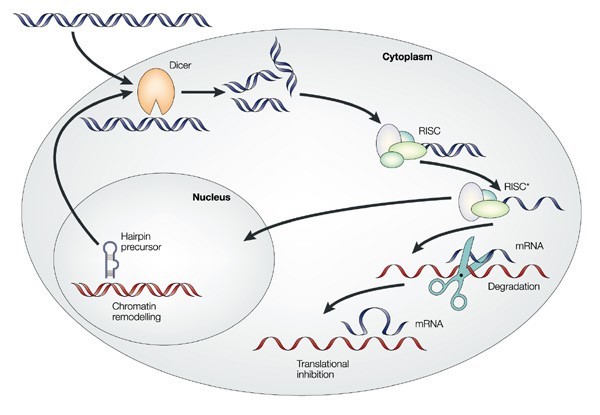Inventors at Georgia Tech have discovered a broad and extensive new category of targets for interference RNAs (iRNAs) exclusive of mRNA. They have demonstrated that iRNAs may be used to manipulate biological processes that do not explicitly involve mRNA. New iRNAs can be directed at non-coding RNAs such as ribosomal RNAs (rRNA) and transfer RNAs (tRNA). An iRNA that targets a non-coding RNA is called a non-coding active in interfering RNA (nciRNA). Such nciRNAs cause degradation of non-coding RNAs in vivo and are highly active in biological assays. Because cells are sensitive to disturbances of the translational machinery, nciRNA-induced cleavage of targets other than mRNA, such as rRNA, offers an efficient mechanism to induce mortality in eukaryotic cells and organisms. The nciRNAs can be programmed with the desired degree of specificity, depending on the degree of sequence conservation, to selectively target and kill eukaryotic organisms at a selected phylogenetic level. Thus, nciRNAs can be directed at one species within a complex mixture of organism types.
- Novel group of RNA interference targets with utility in basic research and practical applications
- Non-coding interference RNAs (nciRNAs) offer an efficient mechanism of mortality in eukaryotic cells
- Highly specific targeting of pests or pathogens
- Reliance on widely-known degree of conservation of sequences of rRNA or tRNA for specificity of activity
Agriculture
- Used as toxins with programmed specificity
- No harm to non-target organisms such as pollinators or other beneficial insects
Therapeutics
- Target plant or animal pests
- Used for highly specific targeting of eukaryotic pathogens
RNA interference is a revolution in biology that has provided a breakthrough in understanding how genes are turned on and off. Also known as gene silencing, an RNA molecule of appropriate sequence will down-regulate a given gene by preventing a specific messenger RNA (mRNA) from producing a protein. Targeted gene silencing has important applications in medical therapeutics, biofuels, agriculture, and basic research. A limitation in the application of RNA interference technology is that the only targets available to date have been mRNAs.

